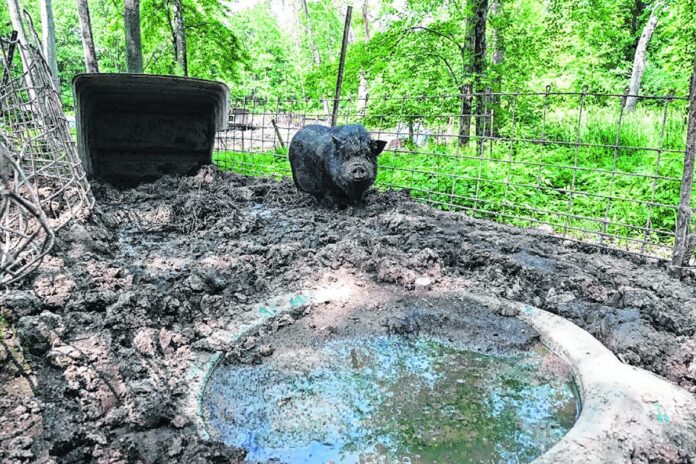
VAN BUREN TWP. — Pig rescue organizations from across the country are teaming up to find new homes for more than 60 pigs at the center of a neglect case on Becks Grove Road.
The Indy Pig Rescue Facebook page was created at the beginning of June to start collecting donations and organizing volunteers to remove the animals and find them new homes. Rescue organizations from Tennessee, South Carolina, Kansas, Colorado and Indiana have all stepped up to help.
The volunteers began work this week to remove the pigs from property owned by Roy Fish, 65, and Penney Carey, 50, both of 8571 W. County Road 275S, Columbus. In February, Fish and Carey were charged in Brown Circuit Court with two counts each of cruelty to an animal, both Class A misdemeanors.
A report filed in February by Animal Control Officer Amanda Sisson included descriptions of nearly 90 animals’ living conditions, including inadequate shelter, deep mud and muck, and no visible food or water.
[sc:text-divider text-divider-title=”Story continues below gallery” ]Click here to purchase photos from this gallery
As of June 5, the rescue group had raised nearly $16,500 to help cover the cost to move the animals, build shelters for them and get water to them. Land in Noblesville has been donated as temporary housing for the pigs.
Once there, all of the pigs will be seen by a vet, spayed or neutered and microchipped. Health certificates and blood work will also be done to allow the pigs to cross state lines to their forever homes.
"This is what we do," pig rescuer Paula Davis said.
"We’re trying to save as many pigs as we can and try to educate people on what can happen when you buy one of these little teacup pigs, thinking you’re going to have a little Chihuahua to carry around in your purse."
Davis works in Indiana doing pig rescue transports. She also does fundraising for pig rescues. She said Carey contacted her in May to help remove the pigs from the property.
"I asked her how many pigs, because normally people call me with one or two pigs to re-home. She said about 60, and I’d like to fall on the floor. She didn’t mention the criminal case or the neglect," Davis said.
"We’re dedicated to finding a home for every one of them."
One of the other women Davis had contacted about removing the pigs found a news story about Carey and Fish’s neglect case.
"I remembered I had seen that way back in December, but nobody contacted us or anything. We thought it was still in the works and nobody was moving on it," Davis said.
Animal Control officers with the Brown County Sheriff’s Department first became aware of animals on property owned by Fish and Carey a few years ago when pigs would get loose. Sisson had met with Fish and Carey several times over the past six years, and they had acknowledged ownership and responsibility for the animals on the property, her report said.
After news of their arrests hit the news, readers began asking why it took so long for charges to be filed and what would happen to the animals now.
Law enforcement has to work within legal rules, said the officers working on the case.
In March, animal control officer Amanda Sisson said that over the years, Fish would do a “Band-Aid fix” to problems when approached by Animal Control.
Also, the animals are the property of Fish and Carey, and if law enforcement was to remove them, they’d have to go through a legal process, the officers said.
Last week, Brown County Chief Deputy Brad Stogsdill said that officers will be involved in the removal of the animals by providing traffic control on Becks Grove Road for the rescue groups. "We said we would do what we can, absolutely," he said.
Davis said that after speaking with Carey she contacted organizations that worked on bigger cases, like one in Kentucky where more than 450 pigs were removed from one property.
Davis visited the Becks Grove Road property; she also spoke with local law enforcement representatives who explained they did not have anywhere to place the pigs in the county.
The Brown County Humane Society only takes in cats and dogs. There is no shelter for livestock animals in the county.
Last week, Davis and a group of volunteers visited the property to count the pigs and see if any needed immediate medical attention. Two pigs were removed last week and taken to Purdue University for treatment. Davis said Purdue will do most of the rehab for the pigs.
Volunteers counted 65 pigs.
"We have males in with females. We have some pregnancies that are visible. We don’t know how many we have that are not visible. We have pigs that have milk that have no piglets, but we don’t know what happened to the piglets," Davis said.
Davis said the property was not in an ideal condition for pigs to live in.
"People think they’re pigs and they’re supposed to live in mud, but these are extremely intelligent creatures that are loving and caring. When you go and see them like this, it’s just heartbreaking," she said.
Davis said most of the pigs were pets before Carey took them in, after people would call her asking for help.
That’s not an unusual situation, Davis said.
"People bought (the pigs) for pets thinking they’re going to get teacup pigs, because breeders are telling people this to sell these pigs for $5,000 to $10,000. As soon as they start growing, like a pig does, they start dumping them into shelters and rescues," Davis said.
"Or, they underfeed them because the breeder says, ‘Don’t feed them in order to keep them small.’ Then, at a year old, they’re having organ issues and they’re dying off. It’s an epidemic all across the country and Canada. … These aren’t just throw-away animals. Most of these were pets."
"Teacup pigs" is a marketing term breeders use, Davis said.
"We consider a mini-pig anything under a 300-pound pig. They think of a little Chihuahua," Davis said. "Once it gets to 50 or 60 pounds, they want to re-home the pig. We get calls daily."
Davis said that most of the pigs on Becks Grove Road are "not social."
"They are more afraid of you. … They’re not used to being around people. Normally, pigs are extremely social. Most people have them for pets. They live indoors, they sleep in their beds and they’re potty trained. They go outside, they do tricks," Davis said.
"They are not just farm animals that live in the muck and yuck. They are actually very clean animals. They live in the muck because they are forced to, like this situation."
Davis said male pigs were in pens with female pigs, so there’s a chance many more pigs are pregnant.
"Penney said they separated them, kept them separated, but … pigs can breed through chain-link fences, fences and walls … Penney wasn’t aware they could breed like that. They become sexually active at 3 months," Davis said.
Gravel will be hauled to the property to help get trailers back there to get the animals out. "Most of the pens are just makeshift, tied together and they don’t have a gate, so some of them are going to be real tricky," Davis said.
Stogsdill said that there are still seven horses at the property. Carey and Fish have the opportunity to find homes for the horses, too, he said.
"They are owned by somebody. If you had a bunch of cars and they’re like, ‘I don’t like how you have a bunch of cars out in your yard; I’m going to take your cars,’ you just can’t do that," he said.
Carey and Fish have not gone to trial on these charges yet. They appeared in court on June 3 for pretrial conferences. A jury trial was tentatively set for Aug. 14.
Officers continue to go and monitor the animals on the property. "They are being fed. The owners are now in the works of getting the animals removed. They are cooperating in trying to get the animals off the property," Stogsdill said.
Last weekend, volunteers went to the Noblesville property to begin building shelters for the pigs.
"Once we get the pigs there, we need people. The property is being donated for the time being, but no one is on the property. So maybe someone who wouldn’t mind coming by during the day to make sure they had water or feed," Davis said about volunteer opportunities.
"We’re trying to work with the humane society and we have a few local shelters that are going to go by and do it, but 65 pigs takes a lot of work."
[sc:pullout-title pullout-title=”How to help” ][sc:pullout-text-begin]
Indy Pig Rescue is looking for volunteers and cash donations to help in removing more than 60 pigs from a property on Becks Grove Road.
Rescue partners include Kanda Farm Sanctuary in Indiana; Kansas City Pig Rescue Network; Hog Haven Farm in Colorado; Gracie’s Acres in Tennessee; Trails End Wildlife Refuge in Indiana; and Cotton Branch Farm Animal Sanctuary in South Carolina.
For more information on how to donate or volunteer, visit Indypigrescue.org or the Facebook page "Indy Pig Rescue."
Volunteers are needed to help build shelters, check on the pigs at their temporary home in Noblesville and to move the pigs from the property on Becks Grove Road. Money is needed to cover costs related to the removal, including money for water for the animals.
Foster and forever homes are also needed. Veterinarians are also needed to help check the pigs.
"We need a lot to save all of these pigs," volunteer Paula Davis said.
"Any pig that is there that does not have an incurable illness will be saved."
[sc:pullout-text-end]




